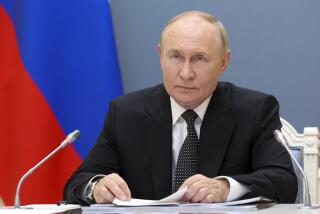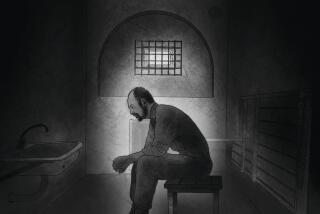Russian convicted of killing Chechen woman is freed from prison
- Share via
MOSCOW — A former Russian army colonel convicted of strangling an 18-year-old Chechen woman walked out of prison 15 months early on Thursday despite an outcry from lawyers and human rights activists.
Yuri Budanov snatched Kheda Kungayeva from her father’s house during a late-night raid in 2000, killed her inside his tent and ordered underlings to secretly bury the body. In court, he said he went temporarily insane and strangled her in a fit of rage because he mistakenly believed she was a sniper.
In a country where public dissent has become a rare commodity, Budanov’s release sparked street protests among outraged Chechens, complaint from the Moscow-backed Chechen president -- and even a statement from the provincial Russian prison expressing official disapproval of the decision to free the convicted killer.
“They spat in my face and in the face of the entire Chechen population,” the victim’s father, Vissa Kungayev, said in a telephone interview. “It’s very important not only for me and for my family, but for all Chechen people, and we are all humiliated by this decision.
“He’s a monster,” Kungayev said of Budanov.
The Kungayev family maintains that the young victim was raped and that the government suppressed evidence of a crime sure to inflame tension in the restive Caucasus region. An autopsy report viewed by The Times in 2001 indicated that rape had taken place, saying that Kungayeva’s hymen had been torn an hour before her death.
A military investigator later dismissed the rape accusation, saying that the body had been “desecrated” after death by one of the men who had been ordered to bury the corpse. The government produced a second autopsy report, this one dismissing the possibility of rape.
In 2000, before facing trial, the soldiers who hid the body were pardoned in a sweeping amnesty for servicemen previously decorated in war.
Budanov’s case was the first high-profile prosecution of a Russian official for crimes against Chechen civilians. His arrest and grueling three-year trial were tracked keenly throughout Russia, where the trauma is still fresh from the two Chechen wars, launched in 1994 and 1999. The case has long been divisive in the country, with the military supporting Budanov while human rights groups called for strict punishment.
A court in Dimitrovgrad granted Budanov’s request for parole on Dec. 24, but an appeal from the Kungayev family had stalled his release. It wasn’t immediately clear why he was set free Thursday.
The Kungayev family’s lawyer told Russian reporters that the officer convinced the court that he had repented of the crime and intended to compensate the family.
Kungayev, speaking from Norway, where he moved with his wife and four surviving children, said that, except for death threats purporting to come from Budanov, he has never heard from the officer.
“The only thing I got from him was a promise to kill me,” Kungayev said. “He never repented. He never said even a word of apology. He didn’t send even a kopeck in compensation.”
Budanov, who had always said he was not guilty of rape, said he strangled the young woman after a night of heavy drinking to celebrate his daughter’s birthday. He was sentenced to 10 years in prison, stripped of military honors and barred from holding military rank for three years. His four previous requests for parole had been turned down.
Despite its blood-drenched recent history, Chechnya has grown calmer in recent years, thanks in large part to the powerful Kadyrov clan’s decision to leave the ranks of insurgents and join forces with the Kremlin. Chechen President Ramzan Kadyrov, an ardent supporter of Russian Prime Minister Vladimir Putin, has been accused of using torture, kidnappings and extrajudicial killings to bring the republic to heel. The war-crushed city of Grozny was rapidly rebuilt as Kadyrov capitalized on the bountiful budget provided by Moscow in exchange for peace and loyalty.
Analysts have speculated that relations between Kadyrov and Moscow may be chilling as tumbling oil prices deplete the budget. Meanwhile, Budanov’s release has uncorked long-simmering tensions.
“I don’t believe that a man who committed such a crime can repent,” Kadyrov told reporters in Grozny on Thursday. “Someone convicted for such a brutal and cynical killing of an innocent, underage schoolgirl should not be granted parole.”
Demonstrations have erupted in Chechnya since Budanov’s parole was originally granted in December. For Chechens, the conviction was a rare flash of justice in the murk of sadistic crimes, disappearances and unmarked graves that surrounded the wars -- and peacemaking -- in their restive homeland.
Human rights groups say that between 3,500 and 5,000 people remain missing since the second Chechen war. The Kungayeva kidnapping was a rare case that found its way to court.
“You can feel the air of very, very bitter disappointment all around you in Grozny,” said Natalia Estemirova, Grozny representative for the human rights group Memorial. “The decision to pardon Budanov is really a shattering experience for the Chechen people. It’s a serious political mistake.”
--
More to Read
Sign up for Essential California
The most important California stories and recommendations in your inbox every morning.
You may occasionally receive promotional content from the Los Angeles Times.










